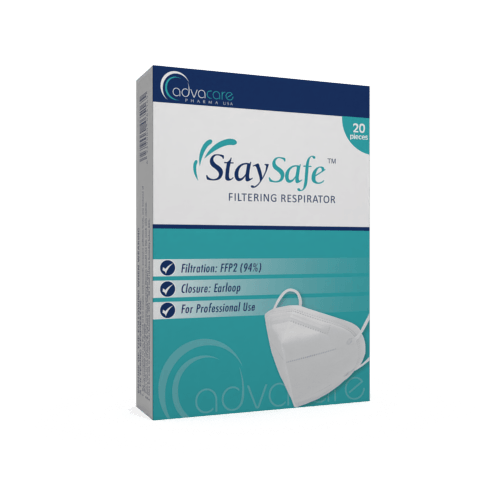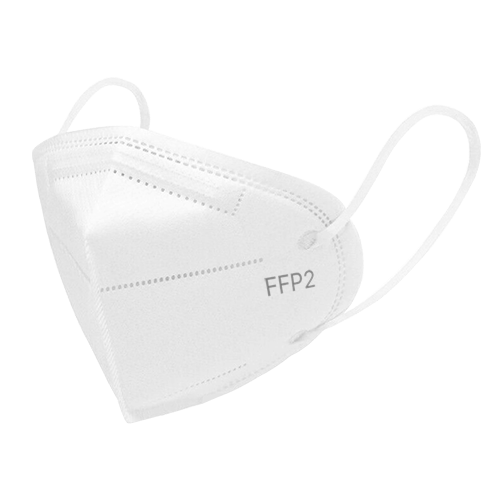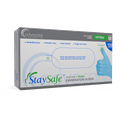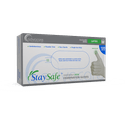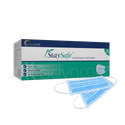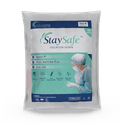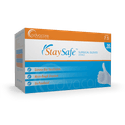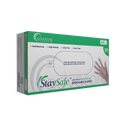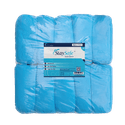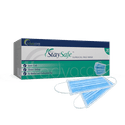Respirator
Type
Shape
Exhalation Valve
Sterilization
Closure
Packaging
What is a Respirator?
A Respirator is a type of personal protective equipment (PPE) that acts as a barrier over the mouth and nose in order to prevent the inhalation of hazardous substances and airborne particles. This type of mask is commonly used in industries such as healthcare, construction, manufacturing, mining, or laboratories.
N95, KN95, and FFP2 respirators are available for exportation, which meet the certifications and standards for their geographical location. Disposable respirators come in different shapes, including cone or folded, in order to accommodate different preferences and requirements.
Respirators are manufactured by AdvaCare Pharma, an American-owned pharmaceutical company with extensive experience in worldwide distribution. These respirator masks are produced in CE/ISO-certified facilities, where regular inspections guarantee that our facilities and our products meet stringent health, safety, and environmental standards.
Product Specifications
Type
Shape
Exhalation Valve
Closure
N95 Protective Face Mask
N95 protective face mask is a particulate-filtering facepiece respirator designed to provide effective protection against airborne particles. It is specifically manufactured to meet the stringent standards set by the US National Institute for Occupational Safety and Health (NIOSH-42CFR84).
The N95 face mask is capable of filtering out at least 95% of airborne particles, including fine dust, pollen, bacteria, and viruses.

KN95 Protective Face Mask
KN95 Protective Face Mask is a particulate-filtering facepiece respirator designed to provide effective protection against airborne particles. It is specifically manufactured to meet the stringent standards set by the Chinese National Standard (GB2626-20 06). This type of mask provides equivalent protection as the N95 face mask.
This KN95 face mask is designed to filter out at least 95% of airborne particles, including dust, pollen, bacteria, and viruses.

FFP2 Protective Face Mask
FFP2 Protective Face Mask is a particulate-filtering facepiece respirator designed to provide effective protection against airborne particles. It is specifically manufactured to meet the stringent standards set by the European Standard (EN 149-2001) and has been approved by the European Committee for Standardization (CEN).
This FFP2 face mask is designed to effectively filter out at least 94% of airborne particles, including dust, pollutants, and microorganisms.
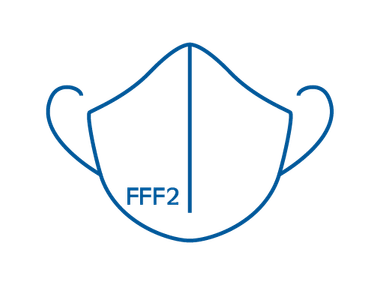
Folded
Folded respirator face masks feature a fold-flat shape and have been specially designed to be easily stored and transported when not in use. They can be folded or flattened when not in use.
When needed, folded masks can be quickly unfolded, which extends them in order to cover the nose, mouth, and chin, providing a secure and comfortable fit. The fold-flat style also ensures proper coverage and a tight seal to minimize the risk of inhaling airborne particles.

Cone
Cone respirator face masks feature a cup shape that creates more breathing space for the individual wearing the mask. This shape allows for easy airflow, which reduces the buildup of heat and moisture.
The cup-shaped design also provides a secure seal on the face in order to provide maximum filtration efficiency. These masks often feature adjustable nose clips or foam strips to better seal and prevent air leakage.
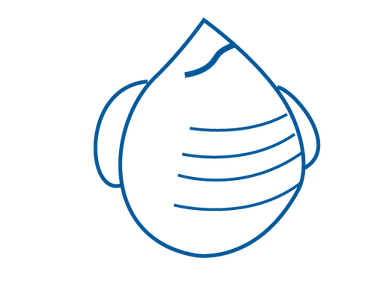
Exhalation Valve
Exhalation Valve features a one-way valve mechanism that allows more of the exhaled heat and moisture to escape the mask while filtering any air the wearer inhales. When the individual exhales, the valve opens and releases any heat or moisture that has accumulated. This feature is particularly beneficial when engaged in strenuous activities or when wearing the mask for an extended period of time.
It is important to note that while exhalation valves offer enhanced comfort, they may not be suitable for use in environments where protection against the spread of respiratory droplets is required.

Non-Valved
Non-Valved respirator masks provide excellent protection by filtering both incoming and outgoing air. They are designed to prevent the transmission of respiratory droplets, particulate matter, and other airborne contaminants.
Non-valved respirators provide a high level of filtration efficiency, which typically exceeds 95% for particles of certain sizes. This quality makes them particularly suitable for use in settings where infection control is a top priority.
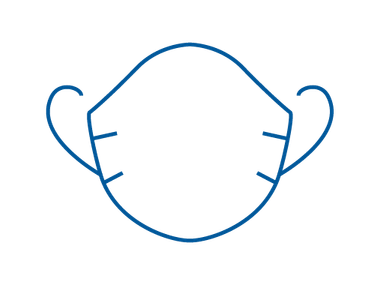
Ear Loop
Ear Loop closure respirator masks are designed with elastic loops that are stretched to go behind the ears. This closure style allows for easy donning and removal of the mask.
Ear loop closure masks offer convenience and versatility, making them suitable for daily use and ensuring a proper seal for effective respiratory protection.
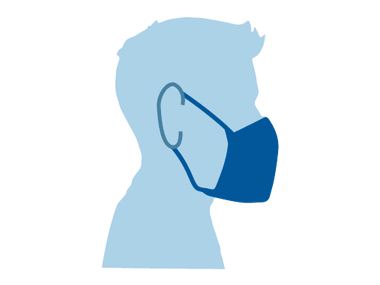
Head Elastic Strap
Head Elastic Strap closure respirator masks are designed with two elastic straps that go around the back of the head. This closure style is favored by individuals who prefer or require a mask that doesn't put pressure on the ears. The elastic straps more evenly distribute the tension, which reduces discomfort during extended use.

Why are we a quality Respirator manufacturer?
AdvaCare Pharma is a leading global manufacturer of Respirators and other PPE medical disposables. Each of our products is accompanied by a comprehensive STED dossier, instilling confidence in our partners and distributors that our medical supplies consistently meet the highest standards of quality.
Drawing upon over two decades of industry experience, we have developed a distribution network that extends to 65 markets across the globe. Our business model is focused on creating a strong partnership with our distributors, and our professional team offers unbeatable assistance throughout the entire process - from supply chain coordination to registration support.
Uses
What is the purpose of a Respirator?
A Respirator serves as an indispensable piece of personal protective equipment (PPE) with the primary objective of safeguarding the wearer from inhaling hazardous substances, including particles, gases, or vapors.
These protective masks create a barrier over the mouth and nose, preventing the ingress of harmful contaminants into the respiratory system.
Respirators find extensive application across various industries such as healthcare, construction, manufacturing, mining, and laboratories, where respiratory protection is of paramount importance for worker safety and health.
What are the recommended storage practices for unused Respirators?
Preserving the integrity and functionality of unused Respirators necessitates adherence to recommended storage practices. These respirators should be stored in a clean, dry, and well-ventilated environment.
Keep them shielded from direct sunlight, heat sources, contact with chemicals, or exposure to extreme temperatures that may compromise their performance. Storing respirators in their original packaging or within a designated storage container is instrumental in shielding them from potential damage.
How should used Respirators be safely disposed of?
The safe disposal of used Respirators is required to minimize the risk of contamination to individuals and the environment. Following their use, respirators should be treated as potentially contaminated items.
To confirm safe disposal, place used respirators within a sealed plastic bag or container before their ultimate disposal. Follow recommended disposal guidelines, which may vary depending on local regulations and workplace policies.
How are Respirators used in hospitals?
Respirators are commonly used in hospitals to provide respiratory protection for healthcare workers when dealing with infectious patients or performing procedures that generate respiratory hazards.
They help prevent the inhalation of hazardous substances, including airborne particles, viruses, and bacteria, encouraging the safety of both healthcare professionals and patients.
How do doctors use Respirators?
Doctors in various healthcare settings use respirators to safeguard themselves against potential exposure to infectious agents, particulate matter, or hazardous chemicals. These medical professionals wear respirators securely over their nose and mouth, following fitting and usage guidelines. This creates a tight seal, reducing the risk of inhaling harmful contaminants during patient care, surgeries, or medical procedures.
Who typically uses Respirators in clinical settings?
In clinical settings, healthcare practitioners, including doctors, nurses, and other medical staff, commonly use respirators. Respiratory therapists, laboratory personnel, and anyone in direct contact with patients or handling infectious materials may also use respirators to maintain a safe and healthy working environment.
FAQs
What are the different types of Respirators available?
Respirators are available in three types: N95, KN95, and FFP2. It is important to note that while N95, KN95, and FFP2 respirators offer similar levels of filtration, they may have different design features based on their requirements for certifications.
What are the benefits of folded versus cone Respirators?
Folded respirators feature a compact and portable design, which makes them particularly convenient for storage and transport. Cone-shaped respirators offer a more comfortable fit and ample space for easy breathing.
Should a valve or non-valve mask be used?
Valved respirators are equipped with a built-in valve that allows for effortless exhalation, reducing heat and moisture buildup within the mask. Non-valved respirators do not have this feature and are suitable for situations where preventing the release of exhaled air is necessary.
Can I order customized configurations of your Respirators?
We provide customization choices for numerous medical devices to address particular user preferences and clinical needs. Our agile manufacturing processes enable us to expand our production capability, ensuring a broader range of specifications to meet diverse market demands.
What quality assurance measures are in place for your Respirators?
We enforce rigorous quality assurance procedures across all stages of production and distribution for our medical devices, bolstered by certifications such as CE, ISO, and/or USFDA, to uphold impeccable standards of quality and safety.
References
Healthcare Respiratory Protection Resources
This resource provides information on NIOSH studies and resources related to elastomeric half mask respirators (EHMRs), including research on respirator exhalation valve and minimum operational flow for loose-fitting powered air-purifying respirators. It also offers a pilot study comparing N95 respirators and medical masks for preventing influenza among healthcare personnel.
Respiratory protection against bioaerosols: Literature review and research needs
This literature review summarizes the available information on the efficiency of respirator filters, the importance of face-fitting characteristics, maintenance and storage, and decontamination of respirators. It also identifies research gaps and emphasizes the significance of regular cleaning and hands-on practice in training sessions for effective respiratory protection.
Why, Where, and How PAPRs Are Being Used in Healthcare
This article discusses the use of both N95 respirators and powered air purifying respirators (PAPRs) in healthcare settings. It presents information from two respirator research studies conducted to better understand the use of respirators in health care: the Prevalence of Respiratory Protection Devices in U.S. Healthcare Facilities Survey (2014) and REACH II Public Health Practice Study—Respirator Evaluation. The article emphasizes the need for respirators to be easy to use, assemble, clean, and test by healthcare workers and identifies desirable characteristics for health care worker respirators.

You might be interested in...
Why AdvaCare Pharma?
As an industry leader, we are aware of our responsibility to provide affordable and sustainable solutions to improve healthcare worldwide.
